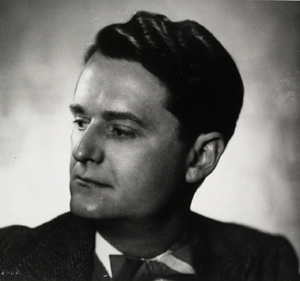 This Goodly Land
This Goodly Land
William March (September 18, 1894–May 15, 1954)

Other Names Used
- William Edward Campbell: birth name
Alabama Connections
- Mobile, Mobile County: birthplace, brief childhood residence, adult residence
- Lockhart, Covington County: employment at age fourteen
- Tuscaloosa, Tuscaloosa County: education
- Point Clear, Baldwin County: brief adult residence
Selected Works
- March, William. Company K. New York: H. Smith and R. Haas, 1933. Rpt. New York: Sagamore Press, 1957. Rpt. Tuscaloosa: University of Alabama Press, 1989.
- March, William. The Looking-Glass. Boston: Little, Brown, 1943.
- March, William. Trial Balance: The Collected Short Stories of William March. New York: Harcourt, Brace and Company, 1945. Rpt. Westport, Conn.: Greenwood Press, 1970. Rpt. Tuscaloosa: University of Alabama Press, 1987.
- March, William. The Bad Seed. New York: Rinehart, 1954. Rpt. Hopewill, N.J.: Ecco Press, 1997.
Literary Awards
- “The Little Wife” included in O. Henry Memorial Award Prize Stories of 1930
- “Fifteen from Company K” included in O. Henry Memorial Award Prize Stories of 1931
- “A Sum in Addition” included in O. Henry Memorial Award Prize Stories of 1936
- “The Last Meeting” included in O. Henry Memorial Award Prize Stories of 1937
Biographical Information
William March was born in Mobile, Ala., the second of eleven children. His father worked in the timber business, and the family moved frequently. March was interested in music, drama, and writing as a boy, but the family was unable to support him in his efforts. At age fourteen, March left school to work in the office of a lumber mill. At sixteen, he got a job in a law office in Mobile to earn money for school. He spent a year studying at Valparaiso University in Indiana, and a year at the University of Alabama studying law. He took a job as a legal clerk in New York City in 1916. In 1917, when the US entered World War I, March enlisted as a private in the Marine Corps. He served in France, was wounded, and earned three medals for bravery. Although he recovered physically, his psychological wounds from the experience remained with him.
March returned to Mobile after leaving the Marine Corps and began working for the Waterman Steamship Company. He rose quickly through the ranks and traveled frequently on Waterman Company business, including an extended stay in Europe. He eventually settled in New York City. He began writing seriously in 1928 as a form of self-therapy. His first short story, “The Holly Wreath,” was published in 1929. He chose Willam March as a pen name, since March was his mother’s maiden name. Company K, his first novel, was published in 1933. March continued to work and travel for Waterman until 1938, when he resigned to write full-time. He lived and wrote in New York until he suffered a mental breakdown in 1947. His friends took him back to Mobile to recover, and he divided his time between Mobile and New Orleans until 1952, when he settled permanently in New Orleans. He died there in 1954.
Interests and Themes
William March’s innovative works express social and cultural criticism and are unflinching portrayals of people’s behavior under difficult circumstances and of the consequences of their actions. Company K is an unsentimental presentation of trench warfare in World War I comparable to Remarque’s All Quiet on the Western Front. March set some of his works in a fictional Alabama location he called Pearl County.
For More Information
Please check your local library for these materials. If items are not available locally, your librarian can help you borrow them through the InterLibrary Loan program. Your librarian can also help you find other information about this author.
There may be more information available through the databases in the Alabama Virtual Library. If you are an Alabama citizen, AVL can be used at your public library or school library media center. You can also get a username and password from your librarian to use AVL at home.
Reference Books
- Simmonds, Roy S. The Two Worlds of William March. Tuscaloosa: University of Alabama Press, 1984.
- Simmonds, Roy S. William March: An Annotated Checklist. Tuscaloosa: University of Alabama Press, 1988.
Reference Articles
- Simmonds, Roy S. "Alabama's William March". Alabama Heritage 3. (1987): 36-47.
Reference Book Chapters and Encyclopedia Entries
- Going, William T. "Some in Addition: The Uncollected Stories of William March"; Essays on Alabama Literature. Tuscaloosa: University of Alabama Press, . 80-96.
- Going, William T. "William March's Alabama"; Essays on Alabama Literature. Tuscaloosa: University of Alabama Press, . 97-113.
Reference Book Prefaces
- Canfield-Reisman, Rosemary M. Introduction. Trial Balance by William March. Tuscaloosa: University of Alabama Press, . xi-xxiii.
Location of Papers
- University of Alabama
Photo courtesy of the Caroline Marshall Draughon Center for the Arts & Humanities in the College of Liberal Arts, Auburn University.
Last updated on May 30, 2008.